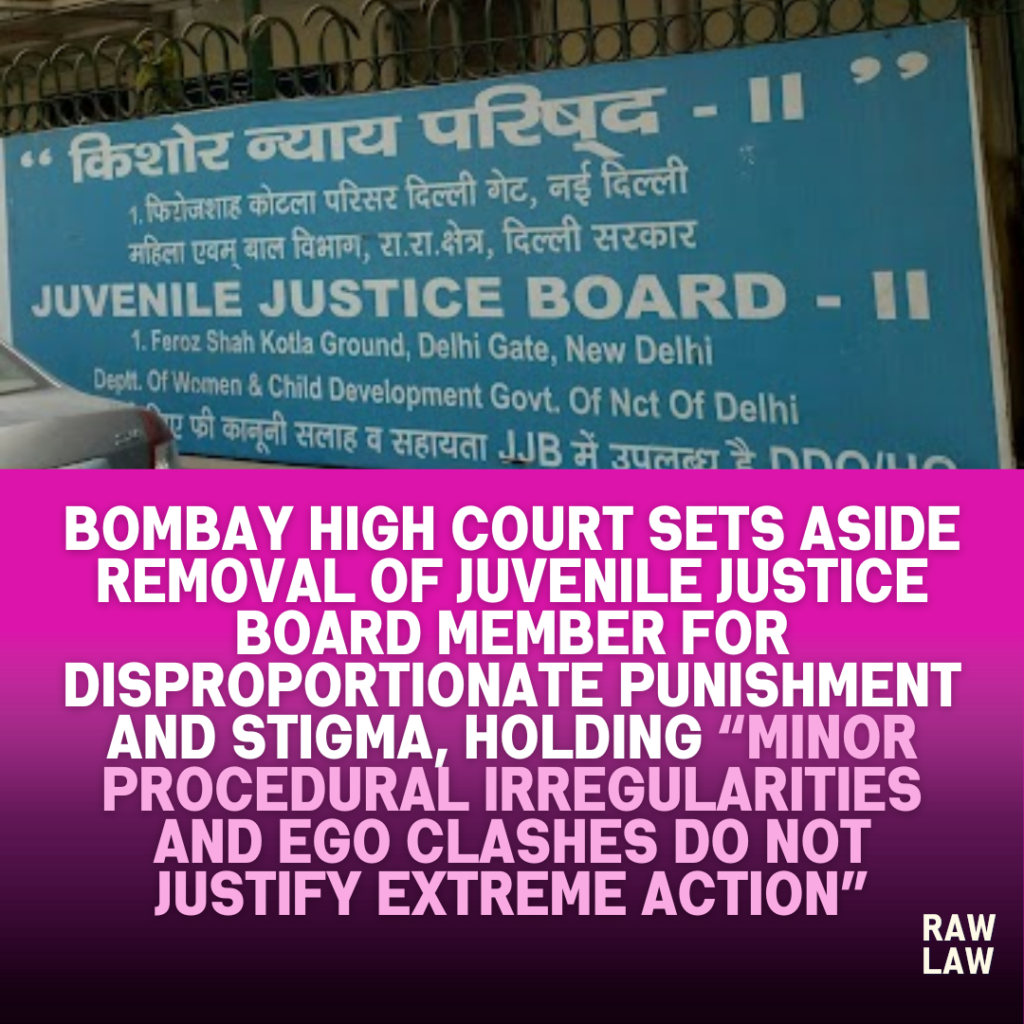Court’s Decision
The Bombay High Court set aside the order removing the petitioner as a Member of the Juvenile Justice Board, holding that the charges established were minor and the penalty of removal was grossly disproportionate. The Court ruled that the removal order carried an unjustified stigma not warranted in the facts of the case and that, at most, counselling or a warning should have been issued instead of a punitive removal. The petition was disposed of, eliminating the stigma without any order on back wages or reinstatement.
Facts
The petitioner, an advocate and lecturer, was appointed as a Member of the Juvenile Justice Board by a notification dated 18 June 2015 under the Juvenile Justice Act, 2000. A complaint alleging misconduct and misuse of power was filed by the Principal Magistrate in December 2016, followed by an inquiry initiated by the State Government, culminating in an order dated 22/25 September 2017 removing the petitioner from the Board. The petitioner challenged the removal, arguing procedural violations, breach of natural justice, and disproportionality in the punishment, seeking to clear the stigma attached to the removal order without claiming reinstatement or financial benefits.
Issues
- Whether the removal of the petitioner was governed by the Juvenile Justice Act, 2000 and its 2007 Rules or by the 2015 Act.
- Whether the removal violated principles of natural justice due to non-supply of adverse material and lack of opportunity for cross-examination.
- Whether the removal order was disproportionate in the context of the charges established.
Petitioner’s Arguments
The petitioner argued that his removal should have followed the procedure under the 2000 Act and 2007 Rules, requiring the Selection Committee to conduct the inquiry. He claimed denial of natural justice as statements relied upon in the inquiry report were not supplied to him, nor was he given the opportunity to cross-examine witnesses. He further argued that the findings, even if accepted, did not amount to misconduct warranting removal, especially for a senior citizen professional whose actions were minor and did not involve corruption or serious misconduct, thereby making the penalty disproportionate and stigmatising.
Respondent’s Arguments
The State argued that the 2000 Act and 2007 Rules had been repealed by the time of the petitioner’s removal, making the 2015 Act applicable, under which the State Government had the authority to remove the petitioner after inquiry. The State contended that the petitioner had been given a fair opportunity to present his case and that the removal was justified due to the seriousness of the charges, which included unauthorised use of a self-made rubber stamp, absence from full-day proceedings, unauthorised student visits to the Observation Home, and lack of cooperation with the Chairperson, which disrupted the Board’s functioning.
Analysis of the Law
The Court analysed that post-repeal of the 2000 Act and 2007 Rules, the 2015 Act governed the matter, and the State Government was competent to remove the petitioner after inquiry. The procedural safeguards under the earlier rules could not be invoked to invalidate the removal. Regarding natural justice, the Court acknowledged that although statements were not supplied, the petitioner did not specifically demand cross-examination or establish prejudice, and some allegations were admitted by him.
Precedent Analysis
The Court referred to:
- Anita Vipat: Establishing that the State Government is competent to remove JJB Members post-2015 Act.
- Poonam Inamdar and Renuka Ghule: Distinguished as they dealt with the 2000 Act and 2007 Rules, not applicable post-2015.
- Principles under administrative law requiring strict adherence to natural justice and proportionality in administrative action.
These precedents guided the Court in assessing jurisdiction, procedure, and the proportionality of punishment in disciplinary matters.
Court’s Reasoning
The Court noted that the primary issues were ego clashes and minor infractions, including:
- Use of a privately made rubber stamp for official purposes.
- Allowing law students to visit the Observation Home without prior permission.
- Sitting on the Chairperson’s chair during a student visit for orientation.
These actions did not amount to serious misconduct or corruption. The petitioner, being a senior citizen and professional, was primarily concerned with clearing the stigma. The Court held that the removal was a disproportionate response, and that counselling or a warning would have been appropriate.
Conclusion
The Bombay High Court set aside the removal order, removing the stigma attached to the petitioner while recording that he was not seeking reinstatement or financial benefits. The Court disposed of the petition, holding that no further action or remand was required in the peculiar facts of the case.
Implications
- Reaffirms the need for proportionality in disciplinary actions.
- Clarifies that minor procedural lapses and personality clashes should not lead to extreme punitive measures.
- Upholds the principle that natural justice must be meaningful but balanced with practical considerations.
Brief on Cases Referred
- Anita Vipat: Held that the State Government is the competent authority to remove JJB members under the 2015 Act.
- Poonam Inamdar and Renuka Ghule: Related to removals under the 2000 Act, which required the Selection Committee’s inquiry, distinguished here.
- Administrative law principles on proportionality, fair procedure, and natural justice supported the decision to quash the removal while acknowledging minor infractions.
FAQs
1. Why did the Bombay High Court set aside the removal of the JJB Member?
Because the infractions were minor, and the penalty of removal with stigma was grossly disproportionate in the facts of the case.
2. Was there a violation of natural justice in this case?
While statements were not supplied, the petitioner did not demonstrate prejudice or demand cross-examination, and the overall procedure did not warrant setting aside on this ground alone.
3. What does this judgment imply for future disciplinary actions?
It emphasises that disciplinary measures must be proportionate to the misconduct proved, especially when dealing with professionals and minor infractions.



